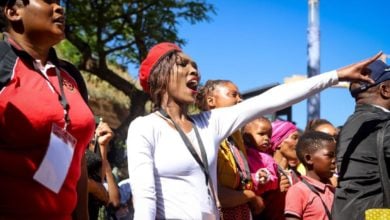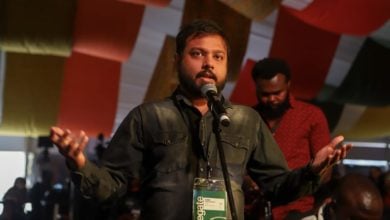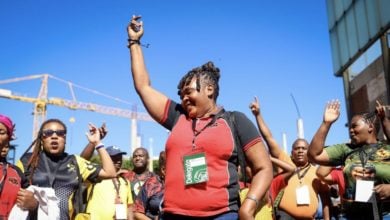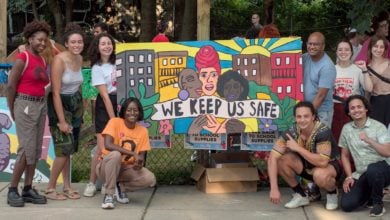The Far Rockaway section of Queens is devastated. Four days after Hurricane Sandy flooded the area, as the nighttime temperatures cool further, the people are still without power, running water and other basic necessities. Because the district is surrounded by water, the area is even colder than other places.
While the roads and sidewalks are filled with furniture and other ruined belongings, there are no great obstructions to driving to Far Rockaway, and thus no excuse for the government. Members of the Party for Socialism and supporters of the Lindsay/Osorio PSL Presidential Campaign drove through the damaged areas, distributing water and batteries. We plan on returning there tomorrow — as well as the hard-hit Lower East Side in Manhattan — with additional resources, including food, diapers and flashlights. (If you are able to make a much-needed donation, please click here.)
When our team first approached a group of people outside a convenience store to offer them water, they declined. We realized it was because they expected us to charge them. After days of price-gouging, they were actually surprised to find people passing out for free something as essential as water.
One older gentleman took six bottles for his whole family. Another young man told us, “We heard FEMA and the Red Cross were supposed to be out here, but we haven’t seen them.” He initially agreed to be interviewed, but then declined out of fear of repercussions from the police. The primarily Black neighborhoods of Far Rockaway have been a major target of the Police Department’s Stop-and-Frisk policy, and ravaged by the mass incarceration epidemic.
The police presence was heavy, and grew continuously as the sun began to set. About a dozen cops stood in front of a boarded up Stop & Shop supermarket—undoubtedly full of food that was spoiling and going unused as people struggled outside. This is capitalism in a nutshell, putting profit and private property over basic human needs, with the cops serving the corporations rather than the people. As in Hurricane Katrina, people who have attempted to seize these needed resources have been described as criminal “looters,” a term of racist vilification.
We delivered water to a father with his son, who were filling up bottles at the fire hydrant. The boy took pride in his job. “We’re going to heat this up so we can take a bath,” he told us with a smile. Many of the buildings still have running gas—making the closing of the supermarkets even more outrageous.
After an hour or so, we came across two parks where the National Guard was stationed. These were the only big crowds we saw, and despite the scarcity of resources and anger with the government, among the people themselves there appeared a high feeling of community. The National Guard was giving out water and one station had a generator where people could charge their cell phones. There didn’t appear to be any agency distributing food, blankets, diapers or other necessities.
The public bus system is very slow and inconsistent. At a makeshift bus stop, we met Juliet, a Guyanese immigrant who works as a home care assistant for an 87-year-old woman, who lives on the ninth floor of a blacked-out Far Rockaway building. The woman she cares for every day is ill, had not been evacuated prior to the storm, and the elevators obviously do not work to take her down. “There’s a lot of talking going on—there’s not a lot of doing.” Juliet explained how terrified she was going up and down the pitch-black stairwell every day. We gave her a ride home to another section of Queens.
Juliet was only going to get a few hours of sleep, before returning taking a three-bus early morning commute back to Far Rockaway. She is only one of thousands of underpaid working-class heroes who are sacrificing to help those in hard-hit communities. By contrast, the government made a priority to get Wall Street up and running, and only after a large public outcry decided to cancel the New York City Marathon.
As we drove out of Far Rockaway, we passed through Broad Channel, Queens, a mostly white neighborhood where a motorboat had become stuck incongruously in the middle of the road. Entire houses seemed to have been turned inside out, in a scene reminiscent of the Gulf Coast after Hurricane Katrina. Hand-painted signs read “FEMA, we need you,” and “Broad Channel: the forgotten town.”
Broad Channel is just one of many “forgotton” neighborhoods across the city. The delivery to poor neighborhoods has been riddled with bureaucratic inefficiency, penny-pinching and misinformation. In Manhattan’s Lower East Side, PSL members reported similar hardships and frustrations, with local non-profits providing better service than the government and Red Cross. Contrary to the ruling-class message of hardship “bringing us all together,” this disaster has again exposed the wide cleavage between rich and poor, between the ruling class and the workers.
The Lindsay/Osorio PSL Presidential Campaign is demanding that the government spare no expense in providing all necessary resources and assistance, free of charge, to help people survive and rebuild their homes. The storm proves once again the necessity for a planned economy to put the resources of society in the hands of the people rather than the banks and corporation, and to stop climate change. A statement put out by the campaign read, “The Democratic and Republican parties say this disaster is not about politics, but it is. It’s about a system that bails out the banks but tells poor and working people to ‘fend for themselves.’ It is about a government that spends billions on criminal wars, but says environmental and disaster precautions are ‘too expensive.'”
Vice-presidential candidate Yari Osorio will be helping in the relief effort tomorrow, and presidential candidate Peta Lindsay will arrive on Sunday to do the same. To join the PSL and campaign volunteers this weekend, contact us at [email protected]. If you cannot attend, but are able to make a much-needed donation, please click here. Every cent you donate will go towards transportation and delivery of resources.






